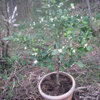Volkameriana rootstock
Somebody was asking here what root stock Meiwa is on from Hirts. Just checked and it is on volkameriana. If I remember right I read somewhere that this was not a good rootstock and fruits did not taste so great. But when I did a search , I found this:
Volkameriana
OOrigin:
Apparently a hybrid that occurs naturally
in India. Also known as Volk and Volkamer
Lemon, it is similar to Rough Lemon in many
characteristics.
Nursery behavior:
Rootstock fruit are seedy, and the seedlings are fairly uniform (about 80% nucellar). Buds push very well, and trees grow well in the nursery. Testing in California began only in about 1989, so less data is available than for some other rootstocks.
Tree size:
Young trees are usually very vigorous, and trees can be large. In a lemon rootstock trial
near Santa Paula, Volk with Lisbon scions produced the largest trees in the trial, but Eureka
trees on Volk were only moderate in size (similar to Eureka lemon on Macrophylla rootstock).
Yield and yield relative to tree size were moderate. With Lane Late navel scion, 11-year-old
trees at two locations were much smaller than those on Carrizo. In a Valencia trial in Pauma
Valley, trees on Volk were slightly smaller than those on Troyer.
Yield:
Trees on Volk typically have average yield for their size.
Yield efficiency:
Moderate.
IInternal fruit quality:
Fair with all common scions.
In comparison with fruit from trees on Carrizo, fruit from trees on Volk have 1 to 2% lower
soluble solids, lower acid, and a lower juice percentage. The fruit are more susceptible to freeze damage, and late-harvested oranges granulate earlier. Lemon quality is good.
External fruit quality:
Peel quality is generally fair to good. The peel is often thicker than that of fruit from trees on Carrizo, and the texture is sometimes rougher
Fruit size:
Generally average in locations where trees are well adapted.
Overall:
A fair rootstock where it is well adapted, particularly on sandy soils. Should not be used
for late-harvested oranges or in cold locations. A poor choice for scions with naturally low solids and acid content. Overall, similar to Rough Lemon, but with slightly better Phytophthora tolerance
So, I'm not so sure why this should not be good for Meiwa? I think this is a fruit where I want a thicker rind and lower acidity?? Since this is in a container and no freezing, or late harvest, should be good? This is my third Meiwa, not sure if the one on C35 will survive (lost already more then 70% of leafs but at least wanted to try to safe it instead of sending it back where it came from) The other one on carizzo is still the same, not growing at all. Two or three of my little seedlings are getting a new leaf. Not willing to give up yet.
I




Related Discussions
Citrus hedge - what to take into consideration?
Q
Cuban Shaddock, a dwarfing rootstock? I doubt it
Q
Compatible rootstocks for C. hystrix (Kaffir lime)?
Q
6 citrus trees on the rooftop
Q